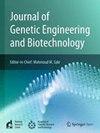A causal relationship between circulating immune cells, plasma metabolites, and pulmonary diseases: a mediated Mendelian randomization study
IF 2.8
Q3 Biochemistry, Genetics and Molecular Biology
Journal of Genetic Engineering and Biotechnology
Pub Date : 2025-07-21
DOI:10.1016/j.jgeb.2025.100537
引用次数: 0
Abstract
Background
Immune cells and plasma metabolites may play important roles in the development of pulmonary diseases, but the relationship between different immune cells, plasma metabolites and various pulmonary diseases is still unclear. In this study, we aim to employ Mendelian randomization (MR) to investigate the causality between immune cells, pulmonary diseases and plasma metabolites.
Methods
We analyzed immune cells and seven pulmonary diseases, including interstitial lung disease (ILD), idiopathic pulmonary fibrosis (IPF), lung cancer, pneumonia, chronic obstructive pulmonary disease (COPD), sleep apnea syndrome (SAS), and tuberculosis (TB), using genome-wide association analysis (GWAS) data for immune cells as an exposure factor and seven lung diseases as outcomes. Plasma metabolites GWAS data served as mediators. We applied MR analysis to explore the relationship between immune cells and pulmonary diseases, followed by two-step mediation analysis to identify potential metabolites that may mediate this association.
Results
As shown in the results, immune cells contribute to disease progression by reducing the protective effect of metabolites on disease or enhancing the promoting effect of metabolites on disease. These include CD4/CD8br and lung cancer, CD62L-CD86+ myeloid DC AC and Pneumonia, and Naive DN (CD4-CD8-) %T cell and COPD. On the other hand, immune cells suppress disease by increasing the inhibitory effect of metabolites on disease or decreasing the promoting effect of metabolites on disease, These include CD39 on CD39+ CD8br and ILD, CD28+ CD45RA+ CD8br AC and TB, Activated & secreting Treg AC and SAS, HLA DR on DC and IPF.
Conclusions
We clarify the importance of the potential mechanisms pertaining to immune cells, metabolites, and pulmonary diseases, highlighting the complex interactions among these factors. This understanding may assist in the diagnosis and treatment of patients with pulmonary diseases.
循环免疫细胞、血浆代谢物和肺部疾病之间的因果关系:一项介导的孟德尔随机研究
免疫细胞和血浆代谢物可能在肺部疾病的发生发展中发挥重要作用,但不同免疫细胞、血浆代谢物与各种肺部疾病的关系尚不清楚。在这项研究中,我们旨在采用孟德尔随机化(MR)来研究免疫细胞、肺部疾病和血浆代谢物之间的因果关系。方法我们分析了免疫细胞和7种肺部疾病,包括间质性肺病(ILD)、特发性肺纤维化(IPF)、肺癌、肺炎、慢性阻塞性肺疾病(COPD)、睡眠呼吸暂停综合征(SAS)和结核病(TB),使用全基因组关联分析(GWAS)数据将免疫细胞作为暴露因素,并将7种肺部疾病作为结果。血浆代谢物GWAS数据作为介质。我们应用磁共振分析来探索免疫细胞和肺部疾病之间的关系,随后进行两步中介分析,以确定可能介导这种关联的潜在代谢物。结果结果表明,免疫细胞通过降低代谢物对疾病的保护作用或增强代谢物对疾病的促进作用来促进疾病的进展。这些包括CD4/CD8br和肺癌,CD62L-CD86+骨髓DC AC和肺炎,幼稚DN (CD4- cd8 -) %T细胞和COPD。另一方面,免疫细胞通过增加代谢物对疾病的抑制作用或减少代谢物对疾病的促进作用来抑制疾病,这些代谢物包括CD39对CD39+ CD8br和ILD, CD28+ CD45RA+ CD8br AC和TB, Activated &;DC和IPF分泌Treg、AC和SAS, HLA DR。结论:我们阐明了与免疫细胞、代谢物和肺部疾病有关的潜在机制的重要性,强调了这些因素之间复杂的相互作用。这种认识可能有助于肺部疾病患者的诊断和治疗。
本文章由计算机程序翻译,如有差异,请以英文原文为准。
求助全文
约1分钟内获得全文
求助全文
来源期刊

Journal of Genetic Engineering and Biotechnology
Biochemistry, Genetics and Molecular Biology-Biotechnology
CiteScore
5.70
自引率
5.70%
发文量
159
审稿时长
16 weeks
期刊介绍:
Journal of genetic engineering and biotechnology is devoted to rapid publication of full-length research papers that leads to significant contribution in advancing knowledge in genetic engineering and biotechnology and provide novel perspectives in this research area. JGEB includes all major themes related to genetic engineering and recombinant DNA. The area of interest of JGEB includes but not restricted to: •Plant genetics •Animal genetics •Bacterial enzymes •Agricultural Biotechnology, •Biochemistry, •Biophysics, •Bioinformatics, •Environmental Biotechnology, •Industrial Biotechnology, •Microbial biotechnology, •Medical Biotechnology, •Bioenergy, Biosafety, •Biosecurity, •Bioethics, •GMOS, •Genomic, •Proteomic JGEB accepts
 求助内容:
求助内容: 应助结果提醒方式:
应助结果提醒方式:


